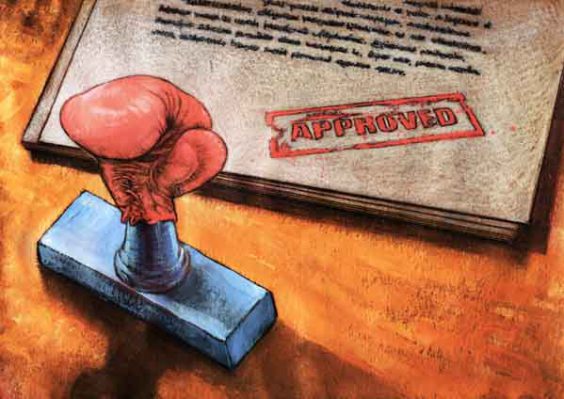Bangladeshi Inquisitions
by Salil Tripathi / June 15, 2016 / No comments

Bangladesh is facing a serious threat to freedom of expression. Image by Marcin Bondarowicz via Himal Southasian.
Freedom of expression in Bangladesh is caught between the machete and the magistrate.
Are you
Muslim or Bengali, they
Asked again and again.
Both, I said, both-then
Rocks were broken along
My spine, my hair a black
Fist in their hands, pulled
Down into the river again
And again.
Each day, each
Night: river, rock, fist.
– Tarfia Faizullah
In a pattern that has now become eerily familiar in Bangladesh, in early August 2015, six men came to the home of Neeladri Chatterjee – a social activist and blogger who wrote under the pen name Niloy Neel – saying they were prospective tenants. Two of the men, reportedly, unleashed their machetes and attacked Neel in one of the rooms at his home, killing him, while his wife Ashamoni was confined to another room.
The 40-year-old wrote frequently and critically against religious fundamentalism on the rationalist blog, Mukto-Mona, meaning “free mind.” In May, Neel had gone to the police station, seeking security, after he saw two men stalking him. Police officials’ advice to him was to leave the country.
This was the fourth such killing in Bangladesh in 2015, and the third involving a blogger writing for Mukto-Mona. Founded in 2001, the blog describes itself as an “Internet congregation of freethinkers, rationalists, skeptics, atheists & humanists of mainly Bengali and South Asian descent who are scattered across the globe.” The first in this spate of killings was in February 2015. Each February, Dhaka celebrates its month-long festival of reading, Ekushey Boimela, at the Bangla Academy. The festival commemorates the martyrs who died on 21 February 1952, when Pakistani security forces fired on demonstrators who were demanding recognition of Bengali as an official language in Pakistan, of which Bangladesh was then part.
Soon after Partition, Bengalis had begun challenging the decision made by the newly formed Pakistani state to make Urdu the sole national language of Pakistan. Most East Pakistanis spoke Bengali, and they realized they would be permanently disadvantaged in accessing public services and jobs; their children would have to adjust in Urdu-medium schools; and they would not be able to fill government forms, do basic transactions at post offices, make complaints to the police, or get themselves heard at courts. This would not only constrain freedom of expression but cripple them economically. It would split the nation culturally, and over time, politically. Those who died in 1952, and those who died in 1971, gave up their lives because language mattered to them as much as their religion. The seeds of the 1971 war lay in the decision to make Urdu the sole official language.
West Pakistan’s failure to understand the power and hold of the Bengali language among the majority of East Pakistanis contributed to the distrust between the two regions. Combined with economic disparities, neglect and perceptions of humiliation, Bangla nationalism got strengthened, particularly after 1970, when East Pakistanis felt that the federal government had neglected them after the devastation caused by Cyclone Bhola.
Read the rest of this article on himalmag.com.
This article was originally posted on November 1, 2015 at himalmag.com. It is republished with permission from Himal Magazine and Salil Tripathi.




